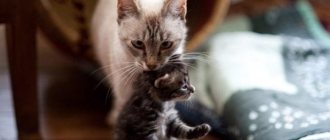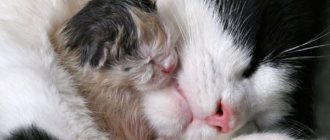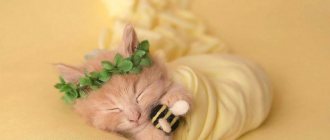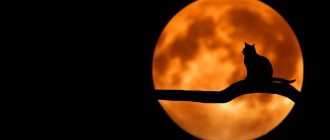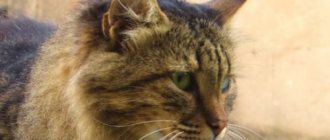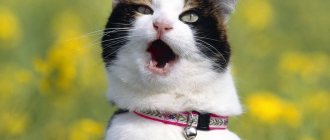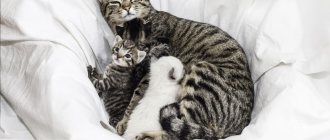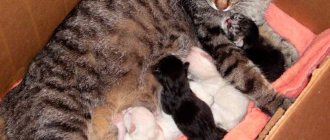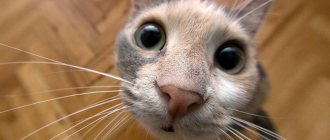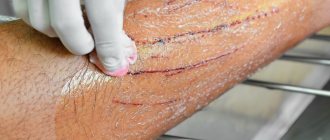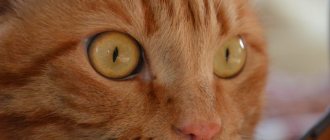Complementary feeding – when to start?
A small pet requires constant attention. If the owner decides to supplement the kitten’s diet, it is necessary to: analyze the health, well-being, and determine the age of the pet. A kitten needs complementary feeding at a certain age; if the animal was bought secondhand or picked up on the street, there is no need to rush to introduce meat into the diet.
The only food a mother feeds her babies for the first month and a half is breast milk. In nature, feeding with mother's milk lasts about two months, but one and a half month old kittens are already starting to try other foods.
The main rule, if you decide to adopt a kitten, is to adopt it at least 8 weeks old.
In this case, the baby will not have to be fed with formula or milk. If you decide to adopt an animal from a friend, you should wait until it grows up.
When a kitten is picked up on the street, it is difficult to independently determine its age. A veterinarian will come to the rescue. It is necessary to take the new family member to the veterinarian to find out the age, check the health, and assess the general condition. Animals taken from the street are often infected with parasites and can suffer from diseases that are dangerous to the human body.
Having determined the age, the veterinarian will advise what food it is time to give the kitten.
If:
- less than a month old - should be fed with formula milk;
- from a month to two - introduce supplementary feeding in the form of solid food;
- more than two months - feed as an adult.
If crumbs are born to a cat already living in the house, you should start feeding them no earlier than after 4 weeks.
Can kittens be given milk: a rhetorical question
A mother cat feeds her cubs for at least 1.5-2 months. Cat milk contains all the necessary nutrients for little tails to grow quickly and have high immunity.
At the beginning of life, mother is the main source of milk
Milk composition:
- Fatty acid
- Enzymes
- Casein
- Lactose
- Low molecular weight protein
- Amino acids
- Minerals
- Vitamins
No animal organism can develop, grow and exist normally without this set of elements. Milk for kittens is a kind of building material. In babies up to 3 months old, the body produces lactase, an enzyme that breaks down milk sugar.
There are often cases when a kitten comes to its owner when it is too young. In this case, he needs to be provided with adequate nutrition, and milk is the most important point.
How to artificially feed?
In some cases, a situation arises when a cat refuses to feed newborn kittens, then the owner will have to feed them himself.
The best option is feeding with adapted milk formulas, which are sold in pet stores. Cow's milk and cream with various additives are also suitable.
Popular recipe: mix a glass of cow's or goat's milk at room temperature with vegetable oil (1 teaspoon), raw yolk. Beat, add honey (1 teaspoon).
Algorithm of actions:
- Prepare supplementary food. The daily norm for a newborn kitten is 22-24 ml.
- Divide feeding into 6-7 meals.
- Single dose – 3-5 ml.
- The interval between feedings is at least 2 hours.
At two weeks of age, the time between feedings should be increased by an hour; when the kitten is one month old, the number of feedings should be increased to 4 times.
Advice: for each meal you need to prepare a new portion of food; you can feed it with a pipette or pacifier. The position for breastfeeding is on the tummy.
Vitamins when feeding dry and natural food
Many owners who care about their pets and their future offspring have a question: is it worth buying vitamins for pregnant cats when feeding dry food?
There is no definite answer to this question; it all depends on what kind of food the pregnant or lactating cat eats. Ideally, this should be an expensive, top-class food designed specifically for those animals that are expecting offspring. Many manufacturers provide such specialized food in their product lines. It is advisable that the cat is already familiar with this brand before pregnancy. Therefore, if a manufacturer you know does not produce special food for pregnant cats, you can give your pet food for kittens from the same company.
When feeding naturally, a pregnant cat also needs additional vitamins and minerals. At the same time, it is important to diversify the animal’s daily menu as much as possible and find out what foods can and cannot be given:
- The diet of a future or already nursing mother should contain products such as poultry or fish liver, eggs, and sometimes fatty varieties of sea fish can be given.
- It would be a good idea to introduce milk and dairy products into the diet, even if the cat refused these products before pregnancy. You can offer her cottage cheese, kefir, yogurt - all these products are rich in calcium.
- It is important that the cat always has the opportunity to eat fresh sprouted greens.
However, you should not overfeed your cat, even despite her position, since it will be difficult for her to give birth if she is overweight. Instead of two meals a day, it is better to increase the number of meals to three or four, but the portions should not be too large. When introducing vitamin supplements into the main diet, you must definitely find out what dosages are recommended to adhere to class=”aligncenter” width=”999″ height=”666″[/img]
How to introduce complementary foods?
Kittens can be supplemented from one month of age.
- Milk porridge made from rice, semolina, and oatmeal is recommended as the first supplement.
- After a few days, you can offer boiled cereal in water, diluted with baby meat food or minced meat.
- During the week, you should increase the percentage of meat in your food, reducing the amount of cereal.
- At 8 weeks it is worth offering pure meat without added grains.
- After 8 weeks, vegetables, crushed to a puree, should be added to the diet.
Diet for feeding
By the age of one month, babies are teething, their bones are forming, and the body needs more vitamins and nutrients.
You can start complementary feeding, which consists of:
- cereal porridge with milk;
- finely chopped meat;
- boiled eggs;
- masses of cottage cheese, glucose, raw yolks;
- meat baby food.
Feeding should be done every other day, and foods should be introduced gradually in order to stop the possible development of allergic reactions in time.
Water in the diet
The right amount of fluid is vital for metabolism. The kitten does not experience an urgent need for additional moisture if it is mother-fed. After offering additional food to your pet, make sure there is enough water in the diet.
Kittens do not like to drink water and may refuse water completely. The solution is to add water to supplementary meals. All food should be liquid in consistency. As an option: place a bowl of water next to the food, and occasionally the kids start drinking water on their own.
What should the owner do to get the cat to accept the kittens back?
First of all, contact a veterinarian and call him to your home. The specialist will make a diagnosis and recommend treatment. After this, the cat will calm down, the pain and discomfort will go away, and lactation will begin to recover. During the normal course of the birth process, the cat is provided with a dark and quiet place so that no one disturbs it and its offspring.
You should not touch the babies with ungloved hands - this can interrupt the smell that is familiar to the mother cat, and she will refuse to feed the babies. A cat that does not show the initiative to feed is affectionately seated next to the babies, petted and talked to, discreetly placing a kitten next to it. You can try to “mark” the kittens with the smell of their mother (a drop of milk or urine), sour cream or another favorite treat. So, by licking the treat, the cat will also lick the kitten.
If the above measures do not bear fruit , the babies have to be artificially fed. At the same time, we must not forget about the other functions of the mother - warming the babies, maintaining hygiene, maintaining a constant temperature in the nest (not lower than 26 degrees). The kittens' habitat is covered with a clean cloth or baby diapers that absorb moisture.
Important! The fabric to be covered must be soft and natural, not fray or stretch, and not serve as a source of static electricity.
Babies should be examined before and after feeding. If there are no alarming signs at first glance, do a light massage of the tummy and areas of the reproductive system. The massage is performed with a soft cotton sponge. The meaning of the procedure is to imitate cat licking. Without such imitation, kittens cannot empty their bladder and intestines, which is why they die. The intestines of a kitten that has not received colostrum are sterile.
If you feed kittens incorrectly , microflora develops in the intestines, contributing to digestive problems, indigestion and bloating. An artificial diet that is unsuitable for kittens can lead to the death of babies.
It is important to prepare for the birth of your pet by making, just in case, a list of necessary purchases for feeding the offspring.
This includes : a heating pad (it’s better if it’s electric).
As a last resort, plastic bottles filled with heated water are used for heating; they need to be wrapped in terry cloth. You can also warm the kitten with your body by squeezing the baby close to you.
Breed characteristics of introducing complementary foods
When compiling a diet, you need to take into account the breed and hereditary factor. Based on the experience of breeders, we can conclude that kittens of some breeds lag behind their outbred peers in development, therefore, feeding is introduced later in time.
According to their development, babies of popular (British, Scottish) breeds can receive additional nutrition as early as 4 weeks after birth.
Maine Coon cubs mature late. The mother feeds the babies until they reach two months of age. Feeding should be introduced no earlier than 8 weeks from birth.
For Sphynx cubs, additional nutrition is introduced from the age of one and a half months. Lack of hair causes the body to expend a lot of energy. Products for supplementary feeding should be high in calories.
TOP 7 popular vitamin complexes
Today, veterinary stores and pharmacies offer a large selection of vitamin complexes and supplements for pregnant cats.
- "Doctor Zoo" Taking vitamins from this manufacturer prevents the development of microelement deficiency in the body of a pregnant cat, and also promotes the proper development of future kittens. The big advantage of this vitamin complex is that it is produced in Russia, as a result of which it is quite affordable. The cost of a standard pack does not exceed 100 rubles.
- "Seva". Seva Sante Animal is the official representative of the French brand in the Russian Federation. It is believed that the products of this brand are of high quality and meet European standards. The line is represented by many different vitamin complexes. Because of this, it would be best if your veterinarian can tell you which product is best for a pregnant cat. The big advantage of the vitamin supplement is its price - it is a little more than one hundred rubles.
- "Logs." The counters of zoological stores offer several series of these products. The most suitable vitamin complex for pregnant and lactating cats is Excel 8 in 1. The composition of this product is rich in all the vitamins and microelements necessary for the pregnant body, and also contains amino acids, brewer's yeast and protein. In this regard, it is suitable not only for pregnant women, but also for nursing cats. "Logs" supports the immune system and helps the animal recover as quickly as possible after giving birth. As a rule, the price of a package of these vitamins is about 300 rubles.
- The feed additive Unitabs MAMA+Kitty takes excellent care of expectant and nursing mothers and their offspring. It contains a complete complex of nutrients: folic acid, magnesium, zinc, iron, iodine, vitamin A and B vitamins, taurine and natural antioxidants. The rich composition of this vitamin supplement will help the pregnant mother’s body cope with viruses and infections and protect her kittens from developmental pathologies. The average price of this product is not too high - 250-300 rubles.
- Vitamin and mineral supplement “Joy” helps normalize metabolism and facilitates the period of gestation of kittens. In addition, this product contains probiotics, which help eliminate digestive problems for the expectant mother. The undoubted advantage of this vitamin complex is its low cost, because a package of 90 tablets costs approximately 200 rubles.
- "Farmavit NEO" This vitamin and mineral complex normalizes metabolism, stimulates the immune system, prevents hypovitaminosis in pregnant and lactating cats, and also ensures the full intrauterine development of kittens. The price of a pack is about 600 rubles.
- "Canina" The products of this brand are the most popular for pet owners. Vitamin supplements from this German manufacturer cannot be called cheap - the average cost of one package is approximately 600 rubles. However, this product justifies its cost, since it reliably protects kittens in the womb from all kinds of pathologies, and also supports the body of a pregnant female.
What should you not feed?
For newborn kittens the following are prohibited:
- Raw cow's milk, food is difficult to digest in the gastrointestinal tract of a tiny animal.
- Milk diluted with water and complementary foods are not nutritious enough; the baby does not receive the required amount of microelements and vitamins.
- Kefir, fermented baked milk, sour cream, yogurt, the baby’s stomach is not able to digest.
- Sausage, meat, cheese, and other products are harmful to the body of a newborn kitten.
- Minced fish, possible parasitic infection.
What vitamins does a pregnant cat need?
Not only people, but also pets need to take vitamins. Pregnant cats especially need them. Even if such a cat eats exclusively premium food, this does not guarantee that its body receives a sufficient amount of necessary vitamins and microelements.
During such an important period as pregnancy, the expectant mother should receive the maximum of nutrients.
To do this, you need to correctly formulate her diet and select a complex of vitamin supplements. It is important for owners to understand which feed and supplements are best to buy during this period. There are special cat foods designed specifically for pregnant women; they are more nutritious and high in calories than regular ones.
Since pregnant animals become somewhat weak and lethargic, their body needs a greater supply of certain vitamins:
- Vitamin D – calciferol. It is necessary for the proper formation of the skeleton in kittens in the womb, as well as for maintaining bone tissue in normal condition in the pregnant cat itself. If the intake of this vitamin is too small, a lack of phosphorus and calcium occurs, as a result of which osteoporosis or rickets develops in kittens, and osteomalacia in an adult cat. Vitamin D is produced by the skin when exposed to the sun and is partially found in food.
- Vitamin A – retinol. It has a general strengthening effect, is beneficial for the skin, vision and fur of a pregnant cat, and takes part in protein synthesis. Contained in the liver of fish and mammals, as well as in fish oil.
- Group B vitamins. They take an active part in all metabolic processes and maintain the condition of the pregnant woman’s coat and skin. In addition, vitamins of this group are responsible for the formation, growth and development of kittens in the womb, and have a direct effect on the formation of nervous tissue and hematopoiesis. They are mainly found in brewer's yeast and food of animal origin, and to a lesser extent in cereals.
- Vitamin C – ascorbic acid. Increases the body's immunity, is responsible for the condition of the skin and mucous tissue of a pregnant woman. Contained in dairy products and finished medications.
- Vitamin E – tocopherol. It has a positive effect on the functions of childbirth and is responsible for the condition of the uterus during pregnancy and after childbirth. Promotes proper absorption of fats and regulates the synthesis of immunoglobulins in a pregnant woman. It is found in large quantities in sunflower oil, as well as in wheat sprouts.
- Vitamin K – vikasol. Takes an active part in hematopoiesis and is responsible for blood clotting. Contained in greens and bone meal.
Taurine is also considered essential in the diet of a pregnant cat. This amino acid supports the heart and digestive system of an adult animal. Taurine is also quite important for offspring - it reduces the risk of developmental defects in developing kittens.
Another essential element during pregnancy is calcium, the lack of which can have a detrimental effect on the skeletal system of not only the mother, but also the small kittens developing inside her.
